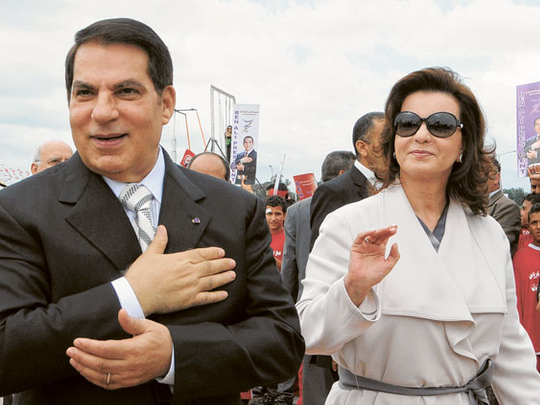
Beyond his amply documented financial corruption, former Tunisian President Zine Al Abidine Bin Ali committed serious political errors that resulted in his disgraceful flight into exile.
As events in Tunisia unravel, the hope that the Jasmine Revolution's propinquity to generate similar upheavals in Algeria, Morocco, Egypt and even Jordan, is gaining momentum. Will we see many more?
While an unstoppable domino effect may be inevitable, more subdued analysts lamented that a dictator like Bin Ali "was feted by the West" when he allegedly kept dangerous Islamists away from power, fought Al Qaida, and helped prosecute the perpetual war on terrorism. Still, those who rejected classic coup d'etats as the only form of political change, applauded the "first Arab Revolution" as a model of popular uprising.
Despite their euphoria, however, few should neglect Western cynicism about democracy in the Arab World. Starting with Tunisia, major powers preferred law and order, which literally meant that no one should be surprised when internal stability is restored there. Simply stated, Tunis will appoint another strongman, and see to it that he is dutifully elected. Still, Bin Ali's fall was inevitable, and should be understood in non-political terms.
According to the "theory of modernisation", which was first developed in the 1950s by the American sociologist Seymour Martin Lipset, democracy was the direct result of economic growth. It should be noted that Lipset's observations generated one of the largest body of research on any topic in comparative politics.
Not surprisingly, many social scientists contested it, but the theory withstood various trials and over time, gained momentum. In summary form, the theory posited that democracy emerged when accurate economic development blossomed, a phenomenon that could be tested through per capita gross national income (GNI) and other indicators.
Lipset articulated how every kind of government eventually transitioned to democracy if a certain level of development occurred. With a single exception in contemporary history, Argentina in 1975, this proved to be highly accurate, true even for authoritarian regimes.
Although Buenos Aires posted a per capita GNI of $6,055 (Dh22,270) in 1975, the year the benevolent dictator Isabel Perón signed several decrees that empowered security forces to "annihilate opponents," no other country in recent memory experienced a revolution if its GNI was above the $6,000 level.
Over this carefully measured threshold, dictatorships mimicked democratic regimes, as they became far more stable because a majority of inhabitants attained unprecedented levels of affluence. Paradoxically, dictatorships often survived in countries where per capita income seldom crossed the $1,000 figure, which proved that utter poverty was an incredible useful tool to dominate nations.
Equally important, and over the years, Lipset and others demonstrated that economies that posted incomes between $1,001 and $4,000 were those that were truly in danger, because increasingly educated populations rejected tangential promises that were never fulfilled. Many resented the cronyism and blatant corruption among privileged elites, especially when illegally acquired wealth was openly flaunted, the writ of tasteless minions.
Except for the six GCC States and Libya, whose per capita GNI topped the $10,000 per year mark, few Arab countries managed to cross the $6,000 threshold. Not surprisingly, and despite serious internal political cleavages, Lebanon recorded a healthy $8,060 GNI in 2009, which ranked it 83rd in the world according to World Bank statistics.
This was as concrete an indicator as any that Beirut's claims for long-term recovery and prosperity were assured. Regrettably, oil-producing Algeria managed to barely hit the $4,420 GNI bar, which ranked it at the 112th spot. It was followed in the Arab World by Jordan [$3,980 — Number 117], Tunisia [$3,720 — 124], Morocco [$2,770 — 136], Syria [$2,410 — 143], Iraq [$2,210 —145], Egypt [$2,070 — 147], Sudan [$1,220 — 160], and the Yemen [$1,060 — 169].
More recent research has confirmed that countries whose GNI oscillated between $2,001 and $4,000, both democratic or dictatorial regimes fell within 20 years. Nicolae Ceausescu ruled over Romania from 1974 to 1989 while General Augusto Pinochet governed Chile, via a military junta, from 1973 to 1990. Bin Ali orchestrated his 1987 palace coup against Habib Bourguiba, to rule for 23 years. Romania and Chile, like Tunisia, posted data within the bracket.
Based on this proven theory, dictatorships are far less stable when they reach the per capita income of $4,000, which means that the current regimes in Algeria, Jordan, Morocco, Syria and Egypt are in the danger zone. While Iraq is mired in a long-term chaotic political situation, the Sudanese (even after its division into two separate countries) and Yemeni governments may manage to hold on for a while longer, although other concerns could create serious destabilising threats.
Only Lebanon is safe from such upheavals, which is a major reason for its longevity as a growing democratic republic since September 1, 1920 under French mandate, and November 22, 1943 as an independent country.
Statistical analyses confirm that the probability for any regime with an income above $6,000 to fall is near zero. Dictators who wish to avert Bin Ali's fate ought to create the economic environment to cross the magical threshold or book luxury palaces in exile.
Dr Joseph A. Kechichian is a commentator and author of several books on Gulf affairs.








